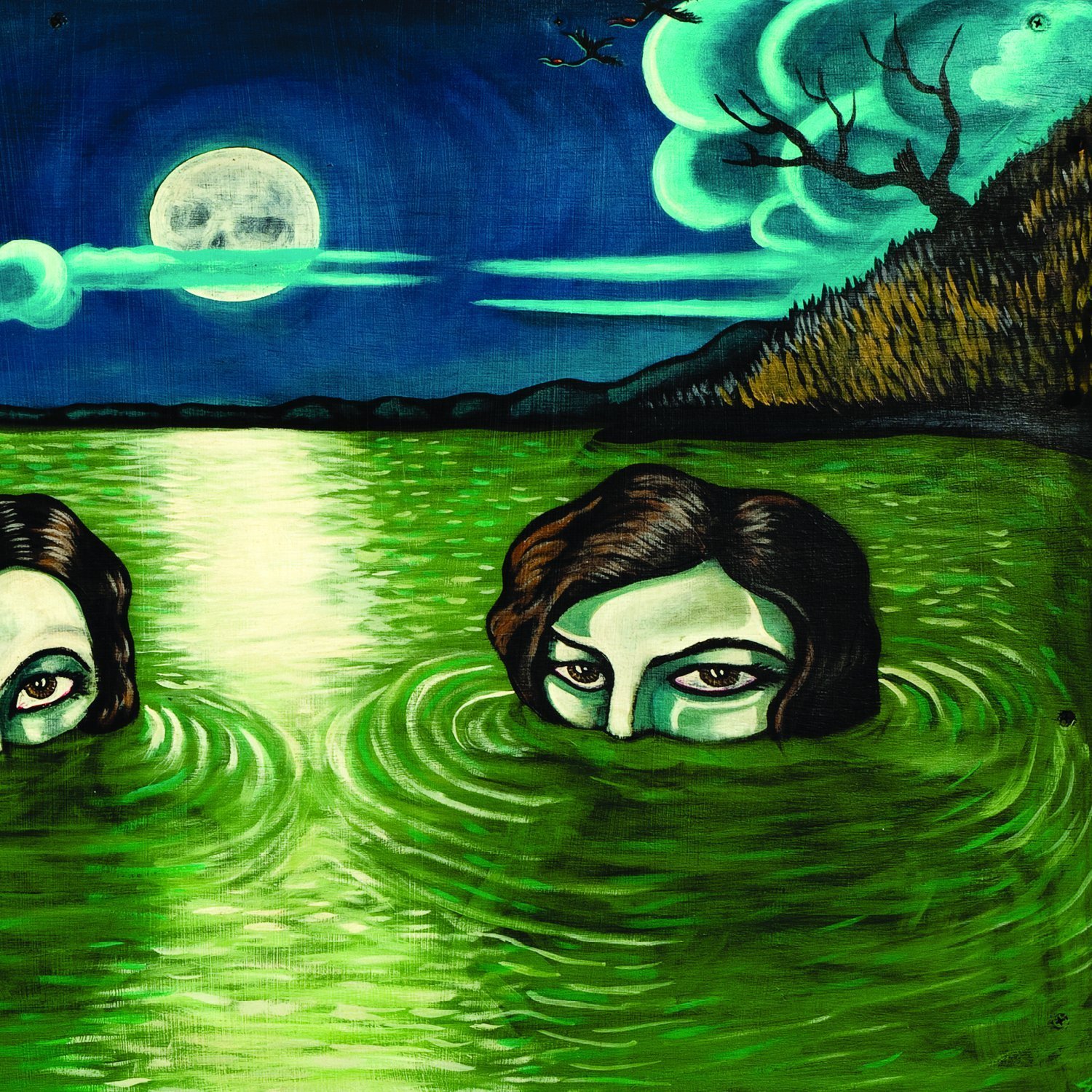
ATO Records
Everything you need is right here.
The Drive-By Truckers’ new English Oceans album makes its entrance with the chainsaw Sex Pistols-style guitar roar that ushers in “Shit Shots Count”. An hour later it bids farewell in a state of total marrow-deep zen (drummer Brad Morgan’s subconscious humming during the miles-deep drums that take “Grand Canyon” home – half Tibetan monk and half Thelonious Monk). In-between those two tracks you’ll find everything you already know and love about the Truckers: grit, smarts, storytelling, big pictures … and the kind of tug-on-the-sleeve-of-your-soul reflection and insight that would be perfectly at home behind the wheel of a ’72 Nova, twin Cherry Bombs a’burbling and a cold one between the knees.
And if you don’t already know and love all that stuff about the Truckers, then trust me: one pass through English Oceans and you will.
What the Truckers have managed to do with this album is continue to evolve as a band while keeping that very same list mentioned above handy, necessity being the mother of invention with some key line-up shifts since their last studio album (2011’s Go-Go Boots ).
Since joining the Truckers as their fulltime bassist in early 2012, Matt Patton has proven himself to be as flexible as he is powerful. If you’re familiar with Patton’s work with the Dexateens, you know all about the powerful stuff; and his session work at Fat Possum Records of late (including contributions to 81-year old Leo “Bud” Welch’s debut album and Jimbo Mathus’ new Dark Night Of The Soul ) illustrate Patton’s flexibility – as David Hood was to Muscle Shoals’ legendary in-house Swampers, Matt Patton is to Fat Possum. On English Oceans, Patton proves he can pile drive a rocker with the best of them; lay down a buttery soul pulse; and then get as spacey and out there as the situation calls for. His brother-in-groove for all these scene shifts is longtime Trucker drummer Brad Morgan, who has made a career out of proving “less is more” when it comes to rhythm (make a drinking game out of how many times Morgan uses his floor tom during this album and you’re going to be very, very dry). You could probably pile Morgan and Patton’s gear into the trunk of that aforementioned ’72 Nova, but the foundations and backgrounds they create for the Truckers’ are massive.
Another facet of the Truckers’ evolution is utility man Jay Gonzalez’ new role of guitarslinger, complementing his already well-established talent at shading, shaping, and surrounding the band’s sound with applications of piano, organ, and accordion. While there are still plenty of Gonzalez’ keys to enjoy on English Oceans (we’ll talk about that in a moment), his six-string work spans the gamut from bolstering the Truckers’ classic triple-geetar assault sound to moments of solo brilliance. Take, for instance, his guitar break on the Cooley-penned “Primer Coat”: in 30 seconds Gonzalez swings from a soaring lead that’s more about mood than melody to a graceful touchdown that quotes the song’s main riff. This is the kind of stuff that deserves to be heard echoing out of practice rooms in guitar stores around the world – sweaty-palmed worshippers trying to figure out those liquidy licks with their teeth clamped firmly on their lower lips.
And then we have band co-founders Mike Cooley and Patterson Hood – the Truckers’ principle voices, guitarists, and songwriters. English Oceans features the strongest ratio of Hood:Cooley tracks to date: out of the album’s thirteen tunes, they wrote six each with the tie-breaker being “Til He’s Dead Or Rises” – a Hood-penned song with Cooley handling lead vocals.
The vibes, moods, and rhythms are varied and captivating. You want rockers? “Shit Shots Count” features guests George Davidson’s sax and Adam Courson’s trumpet conjuring up some serious Bobby Keys/Jim Price Exile -style hoodoo on the outro), while “Hearing Jimmy Loud” nails the glory of every aging garage rocker you’ve ever known who hasn’t yet realized it’ll never go any further than the garage. “When He’s Gone” is classic detuned Gibson growl and dysfunction (“She can’t stand to have him around but she always misses him when he’s gone”).
In the sort of coincidence that’s typical of the pair, Cooley and Hood each brought tunes to the English Oceans sessions that skewer good ol’ boy politics and the evil that often rides shotgun. Hood’s “The Part Of Him” rolls and tumbles along on an Appalachian-flavored groove with a slight psychedelic flavoring, while Cooley’s “Made Up English Oceans” is all long-rider jackets and misty moonlit moors.
“Hanging On” could be another view of the character in Wilco’s “Misunderstood” from A.M. – the tension intensified by Gonzalez’ water-drip keys. “First Air Of Autumn” is pickup truck poetry at its most beautiful; “When Walter Went Crazy” is all the more terrifying because of its gentle delivery; and “Natural Light” belongs on the same shelf as classics such as “Sweet Virginia”, “Dead Flowers” and “Faraway Eyes” – only nothing had to be affected to create this tune’s perfect twang and lurch.
Two tracks stand out as masterpieces of arrangement and emotion, examples of longtime producer David Barbe’s ability to bring the best out of this band in a studio setting while keeping the emotions raw and real.
Hood’s “Pauline Hawkins” was inspired by a character in Willy Vlautin’s latest novel, Free – a declaration of independence delivered on a bedrock of steady-on drums/bass, chirping/snapping/barking guitars, and a mix of piano and thick waves of organ. Cooley takes the lead at 2:53, touching off his solo with a single note that comes roaring in across the plate high and on the outside – a note that nobody would pick to launch their solo – before making its way along like a six-string slinky. When the band drops out, leaving Jay Gonzalez and (what sounds like) a mile-long grand piano to hold down the fort, the comparisons to “Layla” are inevitable … but where that classic tune’s piano coda served as a bit of sunlight after the dark roar of the opening minutes, Gonzalez’ break is a moment of beauty without a letup in the song’s intensity. His lush chords are challenged by squawks of feedback (courtesy of Hood’s new hollow body built by master luthier Scott Baxendale) which refuse to go away; eventually the full band comes slamming back in full force – the kind of rock ‘n’ roll drama that comes naturally to the Truckers.
The album closes with “Grand Canyon” – a lovely and heartbreaking tribute to Craig Leiske, who passed away in January of 2013. As big and sprawling as the place it’s named for, “Grand Canyon” manages a feeling of intimacy at the same time. In its way, the song sums up what many may not understand about the Drive-By Truckers: though their sound is often raw, it’s a rawness that comes from much, much feeling – rather than the lack of it. You do not need to have known Craig Leiske to understand the ache in Patterson Hood’s soul when he wrote these words; and when his voice cracks slightly at the end – “And I’ll think about Grand Canyon, and I’ll lift my glass and smile” – you’ll feel like doing the same.
Which takes us back to Brad Morgan’s atonal soul sounds and his drums that hang on as the track fades, as if they’re unwilling to say goodbye.
The Truckers’ best work ever? I think it’s fair to say it is – with the caveat that this is a different band than the one that cranked out Southern Rock Opera, for example. The best artists of any genre don’t make a career out of trying to repeat themselves.
The Truckers’ music continues to grow … but in many ways, it’s grown closer to the listener.
You don’t get any better than that.
*****
Brian Robbins lifts his glass and smiles over at www.brian-robbins.com



No Comments comments associated with this post